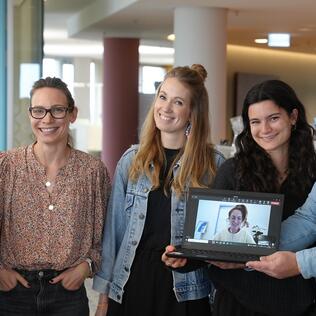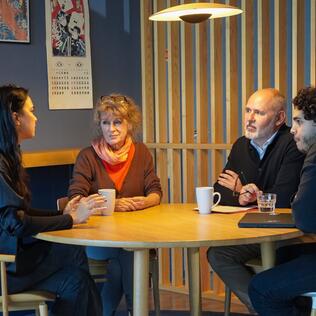Cultural Change Without Frills

At the seventh Cultural Development Experience (#CDX24) on June 24, 2024, over 400 representatives from companies, NGOs, and educational institutions gathered to discuss current change topics. The focus was on performance through culture. Companies must promote their ability to change, design change processes in a self-organized manner, and stay focused to remain competitive in challenging times. Because cultural change is not frills, but a prerequisite for successful transformation – and thus also for successful performance.
To survive in a challenging macroeconomic environment and remain future-proof, organizations must constantly evolve and adapt quickly and flexibly to changing market situations. In this context, the Otto Group focuses on using its resources efficiently and concentratedly to increase its performance. The cultural change process initiated around nine years ago provides process-related support - with close support from shareholders and the entire management team.
In the cultural change process, the core is to constantly question our way of working together to create training fields where we as a company can solidify new, future-essential skills.
Performance Needs Culture
During the remote conference, the change-makers exchanged ideas in six sessions and experienced cultural change in its purest form: authentic insights into different processes, unvarnished examples, pattern breaks, professionalism, passion, and networking.
In the session "Booster or Showstopper – What Role Does Culture Play in Transformation Projects?" it quickly became clear that a serious cultural change has nothing to do with riding unicorns or hugging trees and is certainly not something that can be done "on the side." On the contrary, culture is a crucial performance factor in transformation projects to implement them successfully.

Top management plays a responsible role in shaping corporate culture, as shown by a survey among participants. In a rapid case study sprint during the session "Top Down or Bottom Up – How Do We Organize Effective Change Management?" three exciting approaches were presented on how companies can become more adaptable from within and design and accompany change processes in an integrated and self-organized manner to initiate a truly sustainable change.
The session "Fear or Curiosity – What Does AI Do to Our Culture?" explored the future role of artificial intelligence. Participants discussed – based on a collegial case consultation – how they can take their employees on this exciting journey into the future and even create a genuine "AI movement."
The world of work has been undergoing a massive transformation, especially since the COVID-19 pandemic, becoming more spatially and temporally flexible and noticeably more self-determined from the individual's perspective: from on-site work to remote work to various hybrid work realities. The latter two models are currently being widely discussed, and some large companies are calling their employees back to on-site workplaces. Nevertheless, participants largely disagreed with the argument that remote work impairs culture. The session "Remote, On-Site, or Hybrid – How Do We Create Identification and Togetherness?" showed what opportunities companies have today to actively shape this transformation without taking a step backward.

To remain competitive, companies must also become more international and diverse. Participants learned about the challenges and benefits of international and intercultural collaboration and what it feels like to work together in a team across national borders in the session "Global or Local – How Do We Master Internationalization and Multilingualism?" They even got a scientific-theoretical view of the challenges and opportunities of intercultural collaboration.
When we focus on something, we can push it forward with incredible power and speed.
The role of management in all this was discussed by Bianca Lammers, Division Manager Cultural Change 4.0, Petra Scharner-Wolff, Group Executive Board Member Finance, Controlling, HR, and Alexander Birken, CEO of the Otto Group. There were honest insights into personal and organizational challenges in the cultural change process. One important insight: Communication and continuity are crucial levers for successful transformation. Best practices are needed just as much as transparency about hurdles and failures. "At the Otto Group, we have succeeded in making culture a 'discussable' dimension. By also addressing mistakes, the process becomes more authentic and tangible – and thus more effective," summarizes Alexander Birken.
The #CDX is a format of the Cultural Change Collective, in which more than 500 organizations exchange and share experiences on current challenges in cultural transformation. The Cultural Change Collective emerged from the attitude of constantly needing to change and learn from each other.





